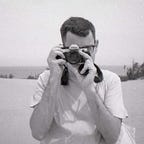Metro grids, off-ramps and idées-fixes
Taipei used to be so huge, so all-encompassing, so pregnant with possibility. The Ximen roundabout glittered with tinsel, like Shibuya Crossing, or your idea of Times Square. Even if you of course knew it was only a pocket version of that archetype (centre of the world, where things happen) — this is how it felt.
The boulevards stretched away into either infinity or suburbs too remote for you even to consider; metro stations and bus stops hinted at exciting destinations, contained in their nomenclature; the low-slung mountains surrounding the city, on their part, suggested a world of damp old trees and China Airlines commercials — sunrises above mountains…—tantalisingly within reach.
It was not necessary to even explore the city that much in order to map out its size, its mechanics. Rather, it felt as if I was enmeshing myself into something fathomless, becoming a cog in the movement of an expensive Swiss watch with many complications. At times, it seemed that by fully scoping out the little sectors of the city where my life took me, the patterns of the urban life beyond would make themselves apparent to me: Suzhou Street became the warren of shops behind the park off Jinhua Street became the tangle of overpasses at the weird open terrain where Civic Boulevard runs into the old city walls.
The Taipei of the 1960s always vibrating just under the surface, as if reflected off the hot macadam during a heatwave; the boomtime logic of the 1980s imposing itself through the panoply of office lobbies — let’s take the porphyry cladding, Chairman, you only live once — and through the taillights of a fleet of old Mercedes, always the 280S model, always shakily veering out of underused parking lots, always with shiny chromed wheel-arches and curtains in the rear windows.
I wasn’t much of a talker then. I walked instead, at odd hours: the late evening, the early morning, 3 in the afternoon on sweltering summer Thursdays. Encompassing the city step by step, in an old pair of Birkenstocks, smoking king-size cigarettes, listening to some old Saint Etienne in bus shelters when it rained.
Of course I went to school sporadically, and sometimes saw friends, and fucked with a certain measure of abandon. The latter, especially, was life-affirming in the face of the certainty slowly creeping up on me: that I was not wholly there, or if I was, not for long anymore. It became clear to me that I would be slowly subsumed into the fabric of the city: become part of the electricity lines, the drains, the camphor trees and the fiber optics strung on the lampposts. To counter that, I had to do something risky from time to time, to be fervently denied after the fact.
There were some two years — eight seasons — of this.
I was tangentially aware, of course, of things happening outside: banks failing, family members getting old, stocks deprecating, but none of it had any bearing to my own situation (talking to no one, eating noodles in a roadside stall in Datong, reading Polanyi — taking notes). Instead, I could only relate to these events through the prism of what I happened to be reading and the map I was walking across.
It was not depression — it was the ecstasy of self-effacement.
And as a backdrop to it all, the never-ending spool of film of stained concrete flatblocks, neighbourhood parks, flash boys and girls, overpasses to nowhere. Or maybe the insides of my retina were the backdrop, and this was all real and tangible? After some ketamine: the Pathe newsreels of imaginary world events everyone is apprised of except me I always used to see unrolling in front of my eyes, melding into footage of an event at the Zhongshan Hall in 1973. On the phone in my underwear: no, I’m not coming home this summer. Yeah, I’m good for money. I miss you too.
But always: that feeling of vast possibilities waiting to be actualised.
I have lived in many bigger cities since then, and have got to measuring Taipei objectively, sizing it up in relation to its spatial dimensions — for what it is. Still, I have never experienced the same feeling in Bangkok, Paris, Hong Kong or Rangoon: the feeling that I’m slowly drowning in a swimming pool (Olympic, cracked tilework) while at the same time sitting in the lifeguard seat, calmly watching myself drown, lighting another cigarette.
It is a handy feeling. Whenever things get high-stakes, my eyes glaze over and I think: but I am not even here at this meeting, not really. I’m actually walking on Dunhuang Road, where the slumblocks are, in my old galoshes, watching the cement trucks go by.
People say, you’re always so zen. No wonder, when you’re watching them from behind the grimy windows of an old office block many years ago.
In my own strange way, I have come to know the city pretty well: like a mix between a taxi driver and a psychiatric outpatient. And, before it is entirely gentrified, I might take you to a place or two before they’re turned into condo blocks. I’m no Pai Hsien-yung, but I do know my tricks.
